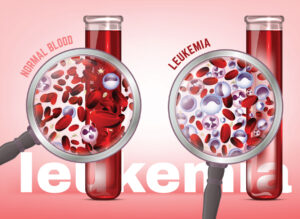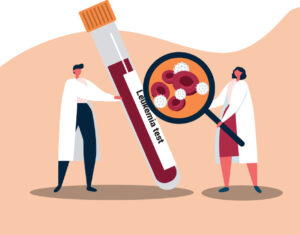Leukaemia is cancer that develops from white blood cells. White blood cells are responsible for fighting infections. Leukaemia leads to an abnormal increase in the production of these white blood cells in the bone marrow.
In acute leukaemia, symptoms may show sooner because cancer progresses quickly. In chronic leukaemia, you may experience no visible symptoms for years. However, there are certain general leukaemia symptoms that are commonly experienced by patients.
What is leukaemia? It is a blood cancer caused by rapid growth in the white blood cells in your body. The abnormal growth of cells happens in the bone marrow, where most of the body’s blood cells are produced.
The abnormal amounts of these cancer cells make it difficult for the other blood cells to be produced in the bone marrow. The reduced production of red blood cells affects the distribution of oxygen to different organs, while the reduced production of healthy white blood cells lowers your immunity.

The leukaemia cells grow in number, then spread and affect other parts of the body. The symptoms of leukaemia differ based on the type of leukaemia you have.
There are two main types of leukaemia: acute and chronic leukaemia.
In this type of leukaemia, cancer progresses very quickly and creates immature white blood cells instead of mature ones and this is most prevalent in children.
However, it can also develop in adults. Treatment is more likely to be effective in children than in adults.
In this type of leukaemia, cancer takes longer to progress. The cancer cells produced may be both immature and mature.
Often, you may show no visible symptoms for many years. It is more prevalent in adults. For this reason, signs of leukaemia in adults are not always visible.
Leukaemia symptoms in adults vary based on the type and how far it has spread in the body. The general signs of leukaemia in adults include:
The exact causes of leukaemia are not certain. However, it usually develops due to genetic reasons. Certain common genetic changes are found in the cancer cells of people with leukaemia.
Environmental factors may also influence its development. These factors could include exposure to radiation or certain harmful chemicals.
Generally, leukaemia develops when certain white blood cells undergo changes in their DNA, the genetic material present in cells. Due to this DNA mutation, the blood cells begin to grow and divide at an abnormal rate. This leads to excessive production of white blood cells.

Our Leukemia specialist will conduct certain diagnostic tests to determine whether you have leukaemia. These tests may include the following:
This blood test assesses the different types of cells in your blood and checks for any abnormal cells.
This test checks the bone marrow to determine the kind of leukaemia you have.
These include imaging tests like a Magnetic Resonance Imaging (MRI) scan and a Computerised Tomography (CT) scan.
The treatments differ based on the type of leukaemia you have, your age, your health, and how much cancer has progressed.
The range of treatments includes:
This is the most prevalent treatment and uses chemicals to kill cancer cells. The treatment will be through a pill, injection, or chemotherapy drugs.
This uses high-energy beams or X-rays to kill the cancer cells and directs the beams to certain spots in the body or applies it more generally across the body.
This uses drugs to target the parts of the leukaemia cell that are making it multiply. It prevents the cells from multiplying or killing the cells. There is a lower chance of normal cells being killed or harmed.
Examples of targeted therapy include monoclonal antibodies.’
Surgery may also play a role in leukaemia treatment.
Surgery of the spleen may be advised if it is enlarged with excessive amounts of cancer cells and it is exerting pressure on organs around it.
This treatment uses drugs to help your immune system fight the cancer cells better. It includes T-cell therapy, which helps the body’s T-lymphocyte cells (T-cells) fight the cancer cells.
This treatment replaces the cells that have been killed by chemotherapy or radiation therapy with new cells. The new cells multiply and lead to the formation of new healthy blood cells.
Our oncology department offers surgical oncology, chemotherapy, targeted therapy, and immunotherapy.
While leukaemia cannot be prevented, certain factors can increase the risk of developing it. These include:
Whether you have acute or chronic leukaemia, it is important to get it diagnosed and start treatment as soon as possible. In acute leukaemia, the cancer cells spread rapidly, and it is advisable to get it checked as soon as you notice symptoms.
In chronic leukaemia, you may not show symptoms for many years. This is why regular testing is important, especially if there are any risk factors like genetic history that could increase your likelihood of developing this cancer.
Our oncology department offers comprehensive diagnostics for risk assessment and screening for timely detection and treatment of leukaemia. We offer state-of-the-art chemo daycare and precision medicine, and our oncology team offers multidisciplinary care to support your needs. To avail of the best treatment for leukaemia based on your condition, reach out to Dr. at CK Birla Hospital or book an appointment.